Tooltester is supported by readers like yourself. We may earn an affiliate commission when you purchase through our links, which enables us to offer our research for free.
Finding the best ecommerce website builder for your online store can be tricky. If you want to launch a successful online business, you’ll need to research all the available options and assess how well their features, performance and prices meet your specific needs.
There isn’t a shortage of solutions when it comes to creating online stores, so this can be a daunting task! That’s why we put together this comprehensive guide to help you pick the best ecommerce website builder for your project.
We used a rigorous testing methodology to assess 12 of the best ecommerce platforms available today. So this is a long article!
If you don’t have time to read the full thing, let me give you a quick overview of the best tools out there:
Squarespace, Weebly and Wix are a good fit if you want to create small (and simple) store projects. These tools also come with many options for content marketing creation (e.g. landing pages, blog posts, etc.).
Shopify and BigCommerce are the best platforms to build large online stores easily. WooCommerce works well for larger projects too, but it may require some technical knowledge. However, it’s more flexible and makes it possible to create multilingual stores.
Finally, a piece of advice for founders with low budgets: Weebly’s online store is included in ALL plans, even the free one. It shows a small ad in the footer, but it includes almost all the basic ecommerce features.
Best Ecommerce Website Builders – Our Top Two Choices
As you’ll see, we’ve split up the best ecommerce website builders for both larger and smaller projects.
To save you time, these are the two top ecommerce solutions:
- Wix: Best ecommerce website builder for small-to-medium projects
- Shopify: Best ecommerce platform for larger online stores.
The Best Solutions For Larger Ecommerce Projects
This table shows ecommerce builders for stores with hundreds of products and all the bells and whistles. You have to be prepared to invest a bit of money and time.
If you are looking for cheaper solutions, scroll down to our table for smaller ecommerce website builders.
| # | Ecommerce Platform | Pricing | Pros and Cons |
|---|---|---|---|
| 1 | 
An Ecommerce Swiss Army Knife! 3-day free trial |
(Prices shown for monthly contracts) Custom domain: $15 / year for a .com |
|
| 2 | 
For Big Ecommerce Sites! Try for free |
(Prices shown for monthly contracts) |
|
| 3 |
Best Add-On for WordPress Try it out |
(Prices here refer to the WooCommerce hosting with Bluehost) |
|
| 4 |  Magento Magento
For larger projects
|
(Prices here refer to the SiteGround hosting services)
|
|
| 5 | OpenCart Suitable for big projects
|
(Prices here refer to the SiteGround hosting services) |
|
| 6 | PrestaShop Popular in Europe
|
(Prices here refer to the SiteGround hosting services) |
|
| 7 | A Solution for Experts Try it out |
|
|
The Best Ecommerce Platforms For Smaller Online Shops
| # | Ecommerce platform | Pricing | Pros and Cons |
|---|---|---|---|
| 1 | Wix Ecommerce ReviewGreat Value Try for free |
(Prices shown for yearly plans, free custom domain included in the 1st year) Tip: Save 10% using discount code “TOOLTESTER10!”. Applies to monthly and yearly plans. |
|
| 2 |  Squarespace Ecommerce ReviewFor Creatives With Ecommerce Ambitions Try for free |
(Prices shown for yearly plans, free custom domain in the 1st year) |
|
| 3 | 
Makes Selling Super Easy Try for free
|
(Prices shown for yearly plans, free custom domain name included in the first year) |
|
| 4 | 
Make any Website a Store Try for free |
(Prices shown for yearly plans) |
|
| 5 | 
Great for European Stores Try for free |
(Prices shown for yearly plans) |
|
The 9 Best Ecommerce Builders For Your Business
In this section we provide an overview of each ecommerce website builder to help you make the best choice for your website and start selling online as quickly and easily as possible!
If you want to compare the features and prices of the different vendors side by side, check out our ecommerce platform comparison tool as well.
1. Shopify
The Ecommerce Swiss Army Knife
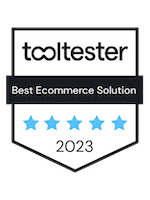 We awarded Shopify our Best Ecommerce Solution badge for 2023!
We awarded Shopify our Best Ecommerce Solution badge for 2023!
With over 1 million merchants, Shopify is, without doubt, the most successful online store builder. It started as a personal project to sell snowboards for a young German living in Canada. Nowadays, Shopify employs thousands and has helped its merchants to generate over $180 billion of sales.
At Shopify they are continuously innovating by launching new features and exploring new opportunities, like making it simpler for users to sell on social media channels. On top of that, their system allows merchants to customize the source code and adapt it to their needs.
Since Shopify is such a big player in the ecommerce space, we’ve created a series of comparison articles for you: Shopify vs Wix, Shopify vs WooCommerce, Shopify vs BigCommerce and Shopify vs Volusion.
What we like about Shopify
Shopify is incredibly easy to use if you consider the number of features available. But at the same time, its system is flexible enough to accommodate projects with unique needs. Shopify will also scale up if you need it to (e.g. your online store needs grow).
Another big plus for Shopify is the big user community and developer ecosystem that supports the product, for example: you can find hundreds of Shopify apps to expand its capabilities. What’s more is that all of their plans include Abandoned Cart Recovery emails, which can help you recover potentially lost sales, as well as other tools and integrations you can employ in your Shopify marketing strategy.
What Shopify should improve
I wish Shopify provided a better way to create multilingual ecommerce websites. They could offer a bit more when creating regular content (e.g. landing pages or blog articles). You won’t be able to 100% customize Shopify’s URL structure, for example: you can’t modify the ‘/product/’ string for product URLs. It’s also not a solution for every budget as their cheaper plan will cost you $26 per month.
> Shopify SEO: is it really good?
Free trial: shopify.com
2. BigCommerce
For Big Ecommerce Sites
Founded in 2009, BigCommerce is always among the top choices when it comes to creating an online store. Since its inception in Sydney (Australia), this ecommerce platform has undergone significant development and has helped its merchants process over $17 billion in sales.
Like Shopify, it’s also a solution that’s 100% focused on ecommerce, powering around 100,000 online stores. Over 500 people work at BigCommerce.
What we like about BigCommerce
BigCommerce has managed to create a system that’s intuitive and easy enough for beginners, but at the same time, it offers a full range of ecommerce features for the pros. BigCommerce is very flexible when it comes to creating product variants and personalization options (e.g. size, color or material).
Unlike Shopify, they don’t charge extra transaction fees depending on the payment method used. If your online store grows, BigCommerce will be able to accommodate it with their higher tier plans.
What BigCommerce should improve
It’s not the cheapest solution; their entry-level plan starts at $29.95 a month. Sadly, there isn’t an easy way to create a multilingual online store with BigCommerce. If you are used to a website builder like Wix or Weebly, you’ll find BigCommerce’s way of creating regular content (e.g. landing pages or blog posts) a bit clunky and limited.
The BigCommerce Standard plan doesn’t include Abandoned Cart Recovery emails (at Shopify you can use it in all plans).
Read our full BigCommerce review or get a free 14 day trial at: bigcommerce.com.
3. WooCommerce
Best Ecommerce Add-On for WordPress
WooCommerce is a bit different from the previous tools; it’s a plugin you can add to any WordPress website to create an ecommerce website. This plugin has become so popular among WordPress developers that it’s the default solution for creating online stores. In fact, in 2015, Automattic, the company behind WordPress bought WooCommerce for over $30 million.
But since WooCommerce (and WordPress) are self-hosted, open-source solutions, you’ll need to find your own hosting provider and manage the necessary updates and issues that come along the way. You can, of course, hire a professional developer to help you if you have the budget.
What we like about WooCommerce
WordPress (and WooCommerce) have a large community, so you won’t be short on options when it comes to designs (themes) and plugins. It’s as flexible as it gets, so if you need a custom solution for your project, you can get it built by a programmer.
The available ecommerce features are almost overwhelming. Store owners have a lot to choose from. It’s also suitable for creating online stores in several languages.
What WooCommerce should improve
WooCommerce is not easy to use and programming knowledge may be needed to change small things in your template. Even though you can find a lot of information online, there’s no WooCommerce customer support channel you can go through when you are stuck. The hosting services aren’t integrated, so you’ll need to find your own host.
4. Ecwid
Make any Website a Store
In 2009 Ruslan Fazlyev, an ecommerce veteran (co-founder of X-Cart), launched Ecwid to allow small business owners to sell their products and services online. Since then, over 1 million merchants have chosen Ecwid for their ecommerce website.
Ecwid is a bit different to other ecommerce website builders; you can think of it as an extension that can be added to any website in order to make it a fully-featured online store. So Ecwid may be pretty convenient if you already have a website without ecommerce capabilities and you wish to sell online.
One thing that makes Ecwid stand out is that you can start for free. Their Forever Free Plan will let you create a small online store featuring 5 products for exactly $0 a month.
What we like about Ecwid
Don’t let Ecwid’s simple concept fool you into thinking it’s a limited platform; it’s actually packed with endless ecommerce features (e.g. abandoned cart saver or point of sale systems).
It can be used to create ecommerce websites on WordPress, Wix, Squarespace, Joomla, Blogger and many more. With the higher plan, you’ll be able to create an iOS or Android shopping app too.
What Ecwid should improve
Even though Ecwid comes with responsive designs, completely customizing your store could require a bit of elbow grease, as you may need to dive into the CSS or purchase additional apps. Ecwid’s SEO has improved in recent times, however, they still have a few glitches that they should fix (e.g. product URLs are not clean).
You will need to already have a website if you are planning on using Ecwid, so if you are just starting out, other solutions would be more suitable.
Free trial: ecwid.com
5. Wix
Great Value
There is no doubt that this Israeli-based ecommerce website builder is the most successful on the market; 200 million users choose Wix to create a website. The speed at which Wix develops new features is breathtaking, maybe only Shopify can compete here. For this reason we see Wix as the best website builder for regular websites.
Even if Wix took longer to create a usable ecommerce module (at first, it was minimal), they ended up designing a solid solution with tons of useful features. On top of that, they have a unique approach to helping small businesses in the form of integrated apps for Hotels, Restaurants, to book appointments and organize events.
What we like about Wix
Wix has always had more templates than anyone, and even though they aren’t fully responsive, you’ll be able to customize them to look good on any device. After Weebly and Jimdo, Wix is probably the easiest-to-use ecommerce builder.
It doesn’t charge extra transaction fees and their (lower) plans are more affordable than those of their direct competitors like Weebly or Squarespace. Wix’s ecommerce features have improved so much in recent years that they are now considered a good ecommerce platform for smaller online stores.
All of Wix’s ecommerce plan include Abandoned Cart recovery emails, which you can set up as an automation.
What Wix should improve
Sadly, when it comes to loading speed, Wix trails behind its competitors. You will only be allowed 1 sub-navigation level and this can make it difficult to accommodate larger online stores. It also lacks flexibility with its confirmation emails as there’s very little room for customization.
Free trial: wix.com
6. Squarespace
For Creatives With eCommerce Ambitions
Squarespace, a New York based builder, emerged on the market in 2003. Since then, it has helped millions to create websites, but also online stores – according to our research, Squarespace has a 14% market share among websites created with a website builder.
When it comes to website builders, there aren’t many as popular and successful as Squarespace. Over the years, they’ve also developed their online store capabilities and become one of the top ecommerce platforms.
What we like about Squarepace
They have an impressive range of ecommerce features, if we take into account that they aren’t an ecommerce focused builder. Not many platforms make it as convenient as Squarespace to sell services and subscriptions online.
Squarespace’s designs are swanky and modern-looking, perhaps only Wix’s can compete. The online store is perfectly integrated with their system; adding products to sell on your blog posts is a walk in the park. They also have a POS system to sell in-person.
What Squarespace should improve
Every time I use Squarespace I feel a bit lost, as their system feels (at times) counterintuitive and some options (e.g. alt text for images) can be challenging to find. Sadly, managing your store’s taxes with Squarespace can be tedious as the process isn’t 100% automatic. They charge extra transaction fees if you use the lower ecommerce plan.
Free trial: squarespace.com
7. Weebly
Makes Selling Super Easy
Weebly is another classic website builder. They started their journey in 2007 and is currently used by over 50 million people. In 2018, the giant ecommerce solution Square opened its wallet and acquired Weebly for a whooping $365 million.
Somewhat surprisingly, not much new ‘stuff’ has happened at Weebly since the acquisition, but then again, their website builder was already an excellent tool for creating an online store.
What we like about Weebly
In my experience, Weebly is the easiest ecommerce platform I’ve ever used; their structured editor makes it a sweet match for beginners. Some of its ecommerce functionality is surprisingly advanced, for example, the shipping and tax calculator. Similar to Squarespace, their ecommerce module will be fully integrated with other parts of your website (e.g. your blog).
What Weebly should improve
Unlike many of its competitors (e.g. Wix or Shopify), they don’t allow offline payment options (e.g. bank transfer or in-store payment). If you are planning to launch a dropshipping project, Weebly won’t be of much help.
There’s not a smart way to create an online store (or website) in several languages. To fully unleash Weebly’s ecommerce power you’ll have to get the Business plan (at $25 month).
Free trial: weebly.com
8. Volusion
A Solution for Experts
Volusion is one of the oldest ecommerce platforms. Founded in 1999, this Texan ecommerce website builder powers 30,000 online stores and employs over 250 people.
If we look at their pricing (starts at $35 a month), Volusion is in the top tier and should offer similar services to Shopify and BigCommerce. Personally, I don’t think it has aged well and there are many aspects I believe they should improve (read below).
What we like about Volusion
In our tests, we found Volusion to be one of the fastest platforms we benchmarked. Volusion’s many features are appreciated, for example, I like ‘the deal of the day’ promotional option that bumps up a product to the top of your homepage.
What Volusion should improve
Expect to spend some time figuring out how things work with Volusion, as they are not an intuitive solution. I am not a huge fan of their templates, and even though they’re responsive, I don’t find them too appealing.
When comparing their system to similarly priced solutions like Shopify or BigCommerce, its platform feels a bit limited. There is not an app store where you can find external apps to enhance your shop’s capabilities (e.g. extensions to improve SEO or email marketing integrations).
Free trial: volusion.com
9. Jimdo
Great for European Stores
Jimdo is originally from Germany and it’s a very popular tool among Europeans (they are fully localised in English). They have achieved relative success due to the fact that 20 million websites have been created using their system.
Being 100% honest, it’s almost unfair to list Jimdo along with top ecommerce platforms like Shopify or Weebly, as their features simply can’t match those of their competitors. However, there are a couple of perks Jimdo offers that no one else does, let me tell you about them.
What we like about Jimdo
It’s affordable; for as little as $10 a month, you’ll get an ad-free online store with 15 products. A nice little added bonus is that Jimdo sites seem, on average, faster than its competitors’. If you are looking for an easy-to-use tool, Jimdo is certainly that. European users will be relieved to know that they fully comply with the complicated ecommerce EU regulations.
What Jimdo should improve
On the other hand, Jimdo feels slightly lacking; it just doesn’t provide a lot of basic ecommerce functionality. For example, you won’t find a way to import or export data, which makes it difficult to manage larger online stores.
It’s not possible to sell digital goods either (e.g. images, PDF documents or songs). Jimdo’s designs are OKish, but they are unimpressive and could use an update.
Free trial: jimdo.com
Best ecommerce website builders for different types of online businesses
Let’s have a look at which is the best ecommerce website builder for different types of online stores.
Big online stores
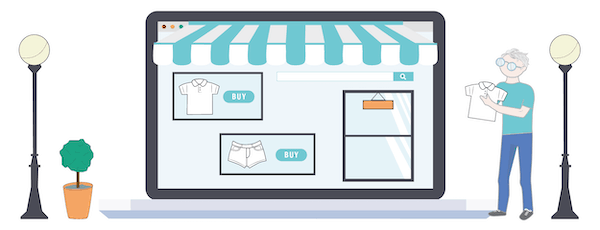
If you are planning to build a large online store (e.g. more than 500 products), and need a robust system, I would encourage you to check Shopify or BigCommerce out.
Another option, if technical challenges don’t scare you, would be to use a combination of WordPress and WooCommerce. If you want an (open-source) alternative to WordPress, check Magento out.
Small online stores
Sometimes it’s great to be a big fish (e.g. Amazon), but sometimes keeping things small may be the best approach. So, if yours will be a small to medium-sized online shop, I would suggest you check out Squarespace and Wix.
Wix may not be ideal for complex site structures and a lot of products (e.g. more than 300). On the bright side, Wix offers an excellent layout and design flexibility that is unmatched by any other solution.
Dropshipping ecommerce sites
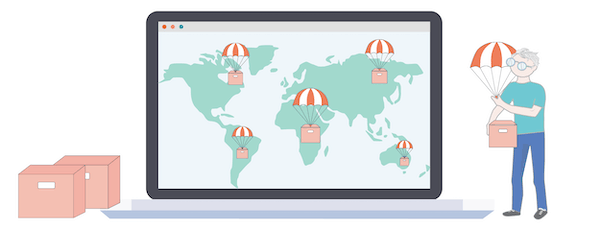
Dropshippers will be happy to know that several (of the bigger) ecommerce solutions integrate with a number of dropshipping providers like AliExpress, Doba or MegaGoods.
Shopify recommends DSers for AliExpress dropshipping (Shopify’s own app, Oberlo, closed down in June 2022). WooCommerce also offers decent solutions via plugins like AliDropship. And Wix supports dropshipping via the Modalyst platform.
Cheapest ecommerce site builder
Not every project will need all the available bells and whistles in terms of ecommerce features, and the price may be a concern. Squarespace and Wix are the most affordable tools out there.
If, however, you already have a website, check out Ecwid as it may save you some money. It’s also a powerful solution.
Multilingual ecommerce sites
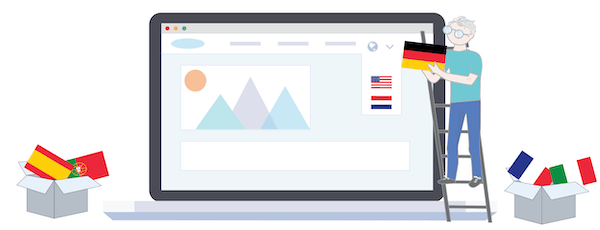
You’d think that these days creating a multilingual online store would be as easy as creating a monolingual one. Truth to be told, launching an ecommerce project in several languages is not that straightforward.
To date, platforms like BigCommerce, Squarespace or Weebly haven’t found a reliable way to solve this. There are indeed multilingual apps you can use, but they are either expensive (e.g. Shopify) or not great (e.g. for SEO).
Therefore, if you need your online store translated into several languages, you should look into advanced ecommerce platforms like WooCommerce or Magento. You may still need to add extensions (e.g. Polylang or WPML for WooCommerce), to give multilingual capabilities to your online store.
Selling services online
Have you ever tried to sell services with a tool that doesn’t have the right capabilities? I have, and it’s not fun, as the whole user experience is just wrong. For example, the confirmation emails make no sense at all and you end up getting masses of messages from confused customers.
OK, if you want a solution that has the adequate software to sell services, you can check out Wix or Squarespace for smaller projects or Shopify and WooCommerce for larger ecommerce websites.
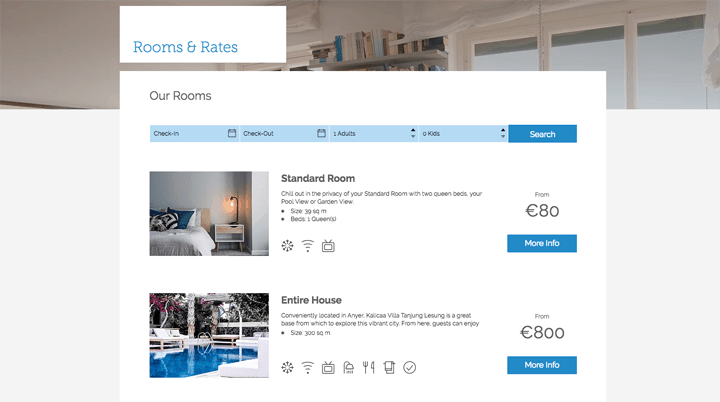
Wix Hotels Booking System
Note: Wix comes with many business-focused apps that are ready to help business owners sell online. For example, they have solutions for Restaurants, Hotels, Musicians, Photographers and even have an integrated booking system. It’s what makes them one of the best website builders for small business in general.
Selling digital products
There are times where you won’t be selling a physical product. For instance, if you are a graphic designer or a photographer, you may be selling your best pictures or illustrations online as digital products, or perhaps you have an ebook that you’d like to start distributing.
Pretty much all the tools in this post are equipped with features that allow you to sell digital products. The only ecommerce website builder that unfortunately won’t cut it is Jimdo.
Selling subscriptions online
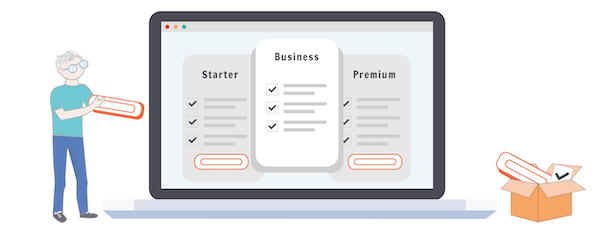
A couple of years ago, selling subscriptions or having recurring payments set up was a big pain. However, a couple of ecommerce platforms have recently taken a big leap and integrated systems so that their users can sell subscriptions.
There are several extensions you can use for WooCommerce to achieve this – warning: technical knowledge may be needed. But if you are looking for a hassle-free solution to sell subscriptions, check out Wix (with the Business plans) or Squarespace (with the Advanced Commerce plans).
Surprisingly, the big players like Shopify and BigCommerce don’t have built-in systems for selling subscriptions, you’ll need one of the available apps for this, which may make your subscription more expensive.
Brick & Mortar Stores
Finally, if you are looking to combine an online store with a physical shop, there are a couple of options to consider.
There are some plugins available for CMSs like Magento and WooCommerce so you can process sales in-person (e.g. WooCommerce POS). However, they aren’t super popular and you still need to get hardware (e.g. a card reader) to use them.
Shopify, Squarespace and Volusion offer a POS system you can use to process sales face-to-face. The advantage of Shopify is that you can also get the hardware (card readers, barcode scanners or cash drawers) from them.
Note: Be aware that these POS solutions aren’t always available in every country, so double check yours before you commit. US-based businesses won’t have any issues here.
What can an ecommerce solutions do for you?
Back in the day, selling online wasn’t an easy journey, but these days online business platforms and ecommerce website builders make it (relatively) easy. For instance, you won’t need coding experience to manage your online store.
But how do these platforms simplify your life as an online store owner? Here ares some benefits:
- Launch your ecommerce store in just a few days without programming knowledge
- Let them handle the updates and security issues*
- Process orders and payments online
- Easily manage the tax and shipping settings
- Support content creation (e.g. landing pages or blog posts)
- Marketing features available to increase conversions (e.g. gift cards or coupons)
- Robust reporting systems to track success and uncover issues
- Multi-channel sales integration (e.g. sell on eBay, Facebook, Amazon or via Google Shopping)
- Quickly import and export data (e.g. for products)
- SEO options customization
* This only applies to solutions like Shopify, BigCommerce, Squarespace Weebly or Wix. Not for CMSs like Magento, WooCommerce and PrestaShop
I am not saying that you won’t need to work hard to create a successful online store, but these tools will let you focus on selling more, as you’ll be free of tedious chores like uploading products to your store or updating plugins and extensions.
How much do ecommerce website builders cost?
That’s an important question, as not everyone will have a big budget to spend on software. Let me tell you how much these ecommerce platforms will cost you:
Shopify, BigCommerce and Volusion prices start from about $29.95 a month. If you need more advanced features (e.g. advanced reports with Shopify) you’ll have to upgrade to a higher plan at around $71 a month. Some things to consider are:
- Shopify charges extra-transaction fees if you don’t use their payment gateway
- BigCommerce has a limit on the sales you can process with each plan; if you go over you’ll be forced to upgrade
- Volusion will limit the products you can sell with each plan. They also have a yearly threshold sales limit.
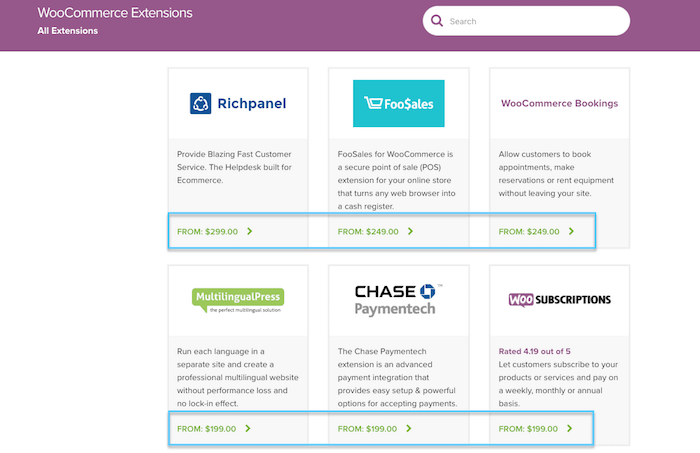
On paper, CMSs like Magento, WooCommerce and PrestaShop are free, as they are open-source solutions. However, you will need to get a hosting service (a decent one will start at $20 a month), and any extras you may require such as templates or plugins.
On top of that, if you don’t have programming experience and need a developer, it can get expensive, as they charge by the hour (e.g. from $30 to $100).
Tools like Wix, Weebly and Squarespace will let you create your online store a bit cheaper: $23, $25 and $18 a month respectively. However, be aware that Squarespace will charge you extra transaction fees (3%) on its lower plans.
Jimdo is by far the cheapest way to start your online store; you can have up to 50 pages for $15 a month. If you need more pages or storage, you can always upgrade.
Finally, if you already have a website, Ecwid is the cheapest option, starting at $15 a month for a functional online store where you can sell up to 100 products. Like Jimdo, they have a free plan with certain limitations (e.g. only 10 products).
| Provider | Plans | Staff accounts | Allowed products | Other |
|---|---|---|---|---|
| Shopify |
$29/month $79/month $299 /month |
2 5 15 |
Unlimited | If you don’t use their gateway processor, extra-transaction fees are charged (2%, 1% & 0,5%) |
| BigCommerce |
$29.95/month $71.95/month $269.96/month |
Unlimited | Unlimited | Upgrade needed if you go over the yearly sales thresholds ($50K, $150K or $450K) |
| Volusion |
$29/month $79/month $299/month |
1 5 15 |
100 5.000 Unlimited |
Upgrade needed if you go over the yearly sales thresholds ($50K, $100K or $500K) |
| WooCommerce, Magento & PrestaShop | From $20 a month for hosting | Unlimited | Unlimited | Plugins, themes and developer fees may apply |
| Squarespace |
$23/month $39/month $99/month |
Unlimited | Unlimited | Extra 3% transaction fee with the Business plan |
| Weebly |
$12/month $26/month $26/month |
Unlimited | Unlimited | Useful ecommerce functionality only available for Business tiers or higher |
| Wix |
$29/month $36/month $159/month |
Unlimited | Unlimited |
20 GB storage 35 GB storage 50 GB storage |
| Jimdo |
$15/month $19/month $39/month |
1 | Unlimited |
10 GB storage 15 GB storage Unlimited |
| Ecwid * |
$15/month $35/month $99/month |
1 2 Unlimited |
100 2.500 Unlimited |
Max. 100MB/file Max. 1GB/file Max. 10GB/file |
* Note that Ecwid offers basic free online stores (e.g. limited functionality and products).
How to choose an ecommerce website builder
Before choosing the ecommerce platform for your project, there are a bunch of factors you should take into account in order to make sure you go with the solution that best fits your needs.
Check out the next video for an ecommerce introduction, and which features you should consider:
Provider Hosted vs Self-Hosted Platforms
The first decision to make is whether you want to use a platform that includes integrated web hosting (prioritising ease) or whether you’d prefer to keep the platform and the hosting separate (prioritising control).
Provider Hosted Platforms
Also known as online shop builders (e.g. Shopify, BigCommerce or Weebly), these are SaaS products that have monthly or annual fees. All these platforms are hosted by the provider and store owners don’t have to worry about updates, security issues or finding a hosting service.
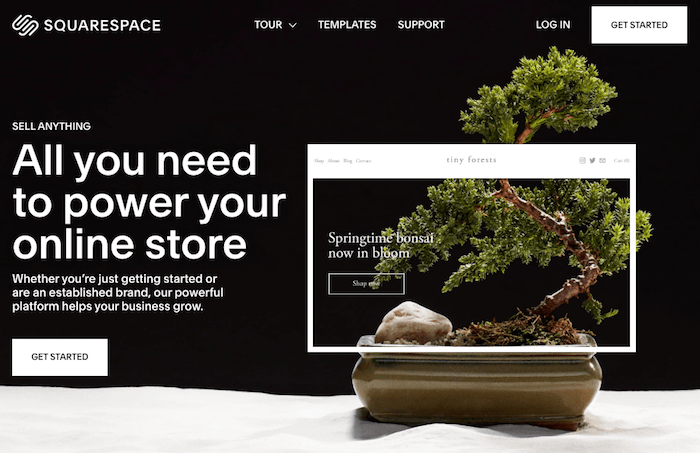
Hosted solutions are the fastest and easiest way to create an online store, but you may lose some flexibility. Even though store builders can be very flexible and some allow code customization, there’s always a limit on the things you can change (e.g. your server setup).
Self-Hosted Platforms
These are generally open-source CMS (Content Management Systems) that require store owners to find their own hosting service. Normally, there isn’t any fee involved to use the CMS, but webmasters are in charge of updates and security.
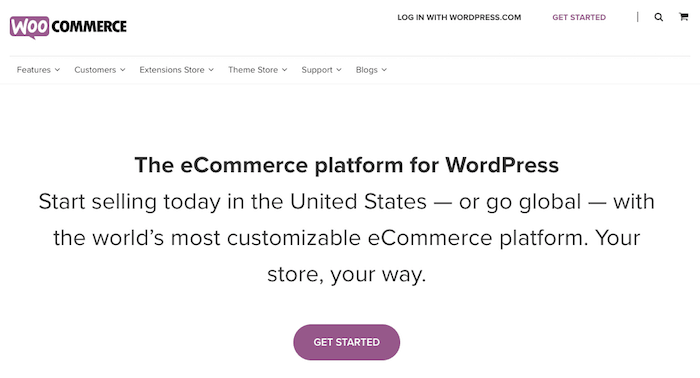
Since you have access to the application’s source code, everything is doable, provided you have coding knowledge. These self-hosted ecommerce platforms can be challenging for beginners as they are usually more complex. If you don’t have the necessary technical experience, you may need to involve a professional developer, and they aren’t cheap.
Note: Be aware that nowadays several provider hosted services like Shopify or Ecwid can also be used with WordPress – you could think of this as a hybrid approach. The advantage is that you’ll have more control over your hosting settings. However it may be confusing to use two systems to maintain your online store.
Usability
You need a ecommerce website builder that matches your technical skills and needs. It doesn’t make sense to go for an advanced CMS like Magento or WooCommerce if you aren’t (a bit) tech-savvy.
And the same applies the other way around; don’t go for a (too) simple and easy-to-use ecommerce platform like Jimdo, when you intend to create a complex ecommerce website (e.g. with multilingual features).
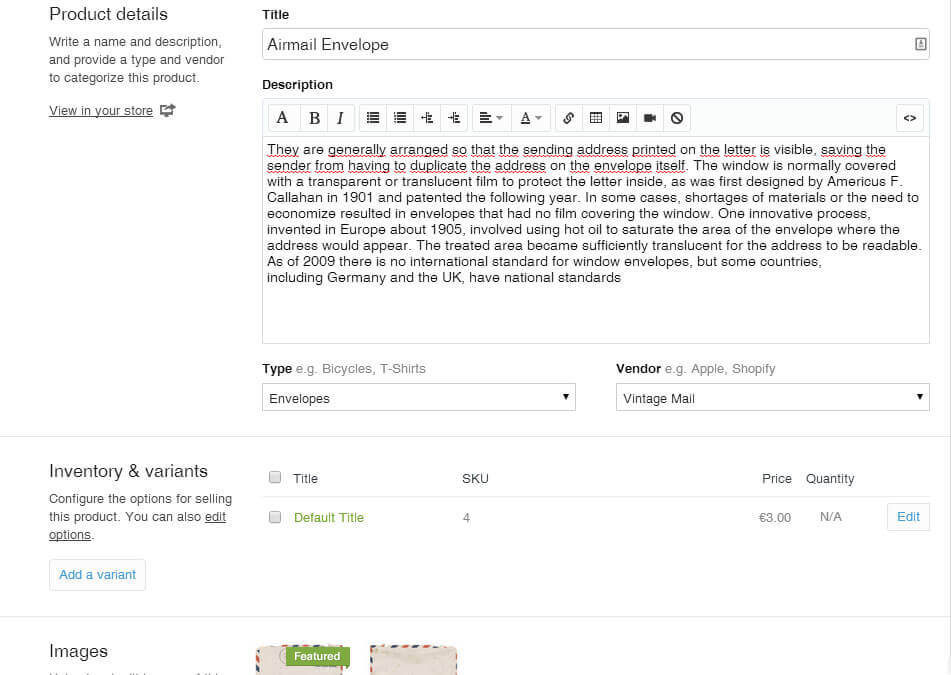
Shopify makes it easy to edit product details
In my opinion, the easiest tools to use to create an ecommerce website are: Wix, Weebly, Squarespace and Jimdo. But they are also a bit more limited in terms of ecommerce features – especially Jimdo.
Shopify (and BigCommerce to a certain extent) are a happy medium. They are reasonably easy to use, but at the same time allow you to scale your online store as they provide pretty much any ecommerce feature you need.
On the other hand, open-source content management systems like WordPress, PrestaShop or Magento will let you create anything you can think of, but often you’ll need programming knowledge even, at times, for simple updates.
Templates & Design
Would you buy a shirt, or anything else, from a brick and mortar shop that wasn’t clean, didn’t have the products nicely displayed and had a 30-minute queue to pay?
If you are anything like me, no way.
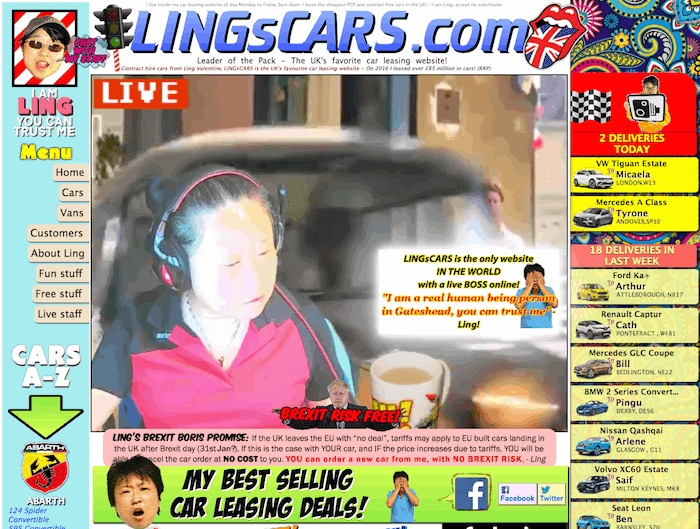
What do you think about this website design? Maybe they are successful, but I wouldn’t want my ecommerce to look like it – no offense meant.
Online stores are the same; you should use neat designs and a good structure to favor user experience and conversions. Things that you should be looking for are:
- Enough (ecommerce-focused) template options to choose from
- All templates should be mobile-friendly so they look good on any screen
- Obviously, the designs should look good and ideally be A/B tested for conversions
- You’ll need a system that allows you to customize your styles and designs
In my opinion, Wix and Squarespace offer the best designs for smaller projects, plus they’re all free. Without a doubt, design-wise, Wix is the most flexible site builder out there. But if you are looking for a fully-focused ecommerce solution, Shopify’s designs look (to me) a bit more modern and they provide you with a decent range of free templates.
Ecommerce features
All the platforms mentioned in this post (even Jimdo), come with the basic ecommerce features you’ll need. For example, a system that processes the orders, tax and shipping management options and promotional features like gift cards or discount codes.

BigCommerce processing orders
However, some tools offer more than others, so make sure you consider what you need before committing to an ecommerce platform.
I would say that, or course, WooCommerce has the broadest range of features available. Ecommerce website builders like Shopify or BigCommerce also provide an excellent variety, but sometimes they are only available with the higher plans.
Additional sales channels
Selling through your online store is great, but for many ecommerce projects, having the option to sell using other channels would be even better. For example, you may want to be able to sell on Facebook or Instagram (e.g. if you sell flashy phone cases), integrate your online store with Amazon or even start a dropshipping business.
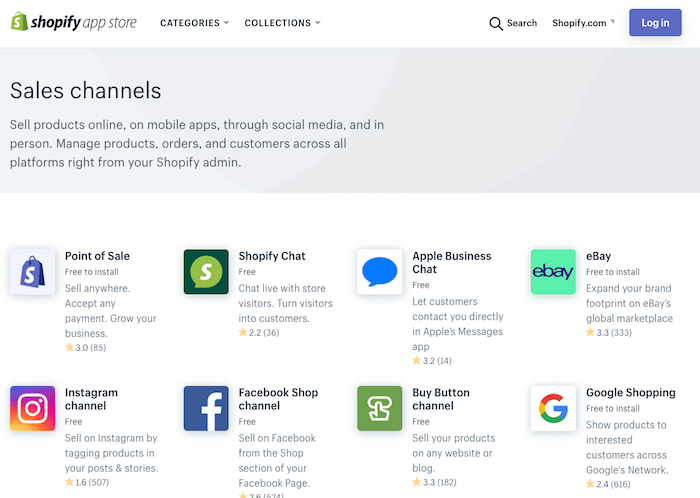
If a multi-channel ecommerce business is your goal, I would suggest you check out Shopify, as it allows to sell on eBay, Amazon, Facebook or Instagram. On top of that, they have their own dropshipping app and will enable you to sell in-person with their Shopify POS.
Most of these integrations are also possible with other providers (e.g. BigCommerce or WooCommerce), but Shopify offers a more all-round experience.
Apps and extensions
These ecommerce platforms are already really impressive, but what blows my mind is that by adding extensions (e.g. plugins or apps) you can add more features and optimize your online store.
For example, by using Yoast SEO for WordPress you can super-charge your store’s SEO, as it unleashes new options to optimize your pages (e.g. XML sitemaps).
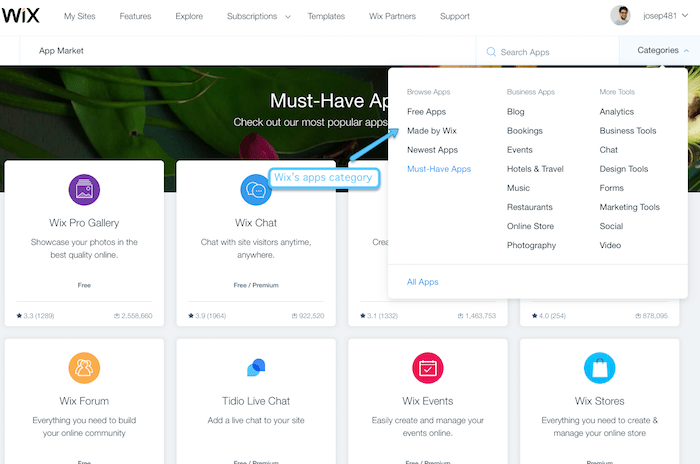
WordPress (and WooCommerce) have the largest community, and the number of available plugins is breathtaking. After WordPress, I would say that Shopify and Wix offer the largest extension repository.
SEO Options
If I’ve learned one thing working at Tooltester over the last few years : you guys love SEO –as do I!
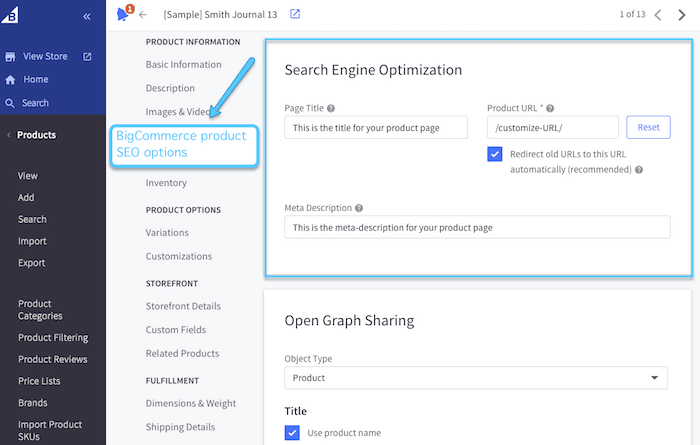
You’d be surprised by the amount of SEO-related questions my colleagues and I receive, and more often than not, these are related to how each platform’s SEO features compare. Of course, every store owner wants to nail their SEO strategy in order to attract organic sales with ‘free’ traffic.
Let me start by saying that, most of the time, when a store isn’t performing well due to SEO, it’s usually because of optimization issues like missing title tags, broken links or weak backlink profiles.
Having said that, some ecommerce platforms offer a bit extra in the way of SEO features. The clear winner here is WooCommerce. However, platforms like Shopify, BigCommerce, Weebly, Wix and Squarespace get many things right and there are examples of SEO successful stores.
But since WooCommerce works on top of WordPress, you can customize virtually any SEO option you wish – this comes in handy for very competitive niches.
But hey!…
Remember that speed is crucial for SEO, so make sure you get a decent hosting provider like DreamHost or SiteGround if you set up your online store with WooCommerce or similar CMSs.
Customer support
Sure, most ecommerce platforms have a knowledge base packed with tutorials you can check. But when you get stuck, having a customer support agent to help you can be a life-saver – or at least save you a ton of time and money.
Personally, I like it when they provide live chat support, though you might prefer email or phone support.
In our experience, Shopify and Jimdo have superb customer care. In our tests, they were quick to answer and the quality of those answers was good. Find out how we evaluated their support.
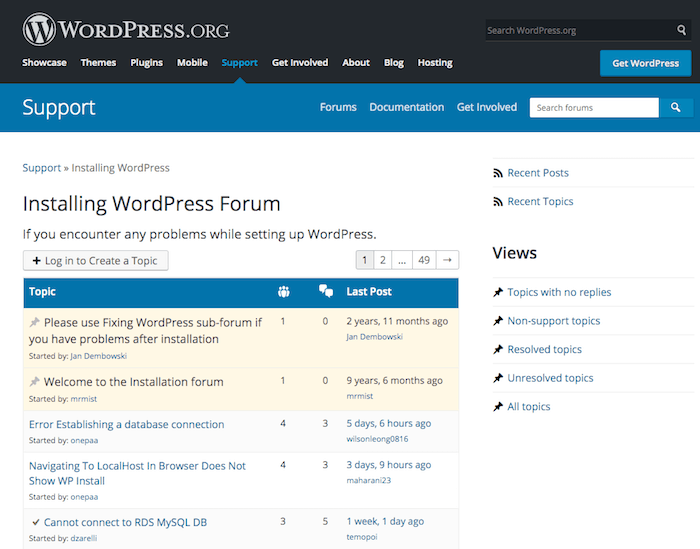
Be aware that open-source apps like WordPress or PrestaShop don’t provide personalized support. If you encounter any issue, be ready to browse the community forums to (hopefully) find a fix for your problem. You can always hire a professional developer, but you’ll need a budget for this.
Performance
Since mobile connectivity exploded in the early 2000s, website owners, users and search engines (like Google) have been obsessed with performance – everyone wants sites that load fast.
Yes, you can have the swankiest looking online store and a bad-ass conversion funnel implemented, but if your online shop is (too) slow, you are doomed; you’ll see conversions drop and search engines will punish your rankings.
But no worries, I have your back. You don’t need to go and test every platform out there to see which ones are fast and which are not, because we’ve done that for you! We checked over 4,000 websites to find the best-performing platforms – here are the results:
Speed results summary
We found out that Jimdo, Volusion, BigCommerce, Webnode, Weebly, Squarespace and Shopify performed OK – desktop sites loaded under 3 seconds.
We weren’t 100% satisfied with the speed of Wix, WordPress and WooCommerce, as sites, on average, needed more than 3 seconds to load on desktop devices.
Let’s not forget about uptime though, as it is equally important. You don’t want an online store that’s down all the time because your provider is incapable of offering stable servers – you will make ZERO sales if your website doesn’t work.
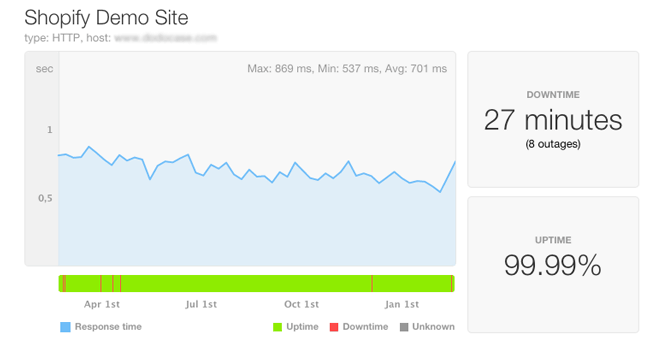
Shopify uptime is greater than 99.95%
As you can imagine, search engines like Google and Bing don’t like websites with long and continuous downtime periods either; they’ll just think your website has vanished from the internet or won’t trust it.
We tested many shop builders’ uptime, so we can tell you which ones are the most reliable. I am happy to report that during the last 12 months every ecommerce builder in this article managed to achieve at least an uptime of 99.95%.
Note: For ecommerce platforms like Magento, PrestaShop and WordPress you’ll need to find your own hosting service. It’s important that you choose a reliable one that gives your website a decent load time and has an uptime of over 99.95%. Check out our latest hosting speed and uptime tests for a clearer picture of their performance. If you ask me, I’d recommend SiteGround and Kinsta for ecommerce websites.
Final thoughts on the best ecommerce website builders
As we’ve seen, there are many viable platforms to create an online store with, however, not all of them are right for everyone. Factors like your technical experience, project size or budget should influence your choice.
As I see it, we can categorize most tools into 3 groups:
1. Simple, easy to use ecommerce site builders
Platforms like Wix, Squarespace or Weebly fall into this group.
In my opinion, these are suitable for (smaller) projects that will have an online store attached. For example, you are planning to promote yourself as a photographer but you’d also like to sell your work online.
2. Online business-focused ecommerce platforms
Platforms like Shopify and BigCommerce fall into this group.
These are suitable for small projects too, but they also scale well and can accommodate huge ecommerce sites. You’ll need a budget, as their starting plans are higher than regular website builders’.
3. Open-source solutions
Platforms such as WooCommerce, OpenCart and Magento fall into this group.
These are a good fit for large projects that have unique customization needs. Being able to choose the hosting provider (e.g. SiteGround or DreamHost) may be an advantage for some, even if it requires more work and technical knowledge.
Well, I hope you now have a clearer idea of what ecommerce solution you should choose for your online store. However, if you have any questions about this, leave a comment and I’ll try to help you.
FAQs
An ecommerce platform is a software environment that allows business owners to sell their products and services online.
All of them will let you create an ecommerce website, but you don’t necessarily need your own website to sell online. For instance, you could sell online using your social media channels, through email marketing, or by integrating your products with marketplaces like Etsy, Amazon or eBay.
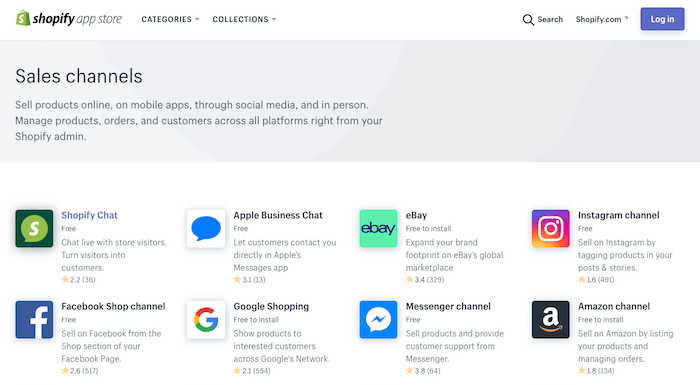
An ecommerce website builder is a tool within an ecommerce platform that allows you to actually make your own online store. These website builders generally offer simple drag and drop functionality, but you can sometimes get under the hood if you need to as well.
The best ecommerce website builders are the ones that are able to meet your specific business requirements. So think carefully about what features you need, both today and moving forwards as your ecommerce business develops!
These are our three favourite free ecommerce site builders:
- Webstarts: free for up to 10 products, includes credit card payments and Paypal.
- Jimdo: no charge for up to 5 product: includes Paypal only.
- Mozello: free for up to 10 items: payments via Paypal and offline methods. Has less features than the other two.
If you’ve already got a website but only need ecommerce as an add-on we recommend Ecwid. The limit here is 10 products too but it’s a more advanced solution overall. Please check out our full article where we review the best free ecommerce website builders.
From the providers listed here, only Jimdo fulfills the requirements for countries of the European Union out of the box.
Write to us! The market changes fast. We are always happy to receive insight on new products.
Etsy is an online marketplace where artisans, makers, and small business owners can sell handmade and vintage items. Etsy also provides Pattern by Etsy, a hosted website builder service for Etsy shop owners to create a standalone online presence with a customizable template, easy website building tools, and integrated hosting.
However, we don’t include Pattern in this list as we find the features too limited. You can read more about Pattern by Etsy in our review, and compare Etsy marketplace vs Shopify here.
We keep our content up to date
07 Sept 2023 - Wix pricing changes
31 Jan 2023 - Small additions
05 Jan 2023 - A couple of smaller price-related updates
15 Dec 2022 - Badge added
THE BEHIND THE SCENES OF THIS BLOG
This article has been written and researched following a precise methodology.
Our methodology











